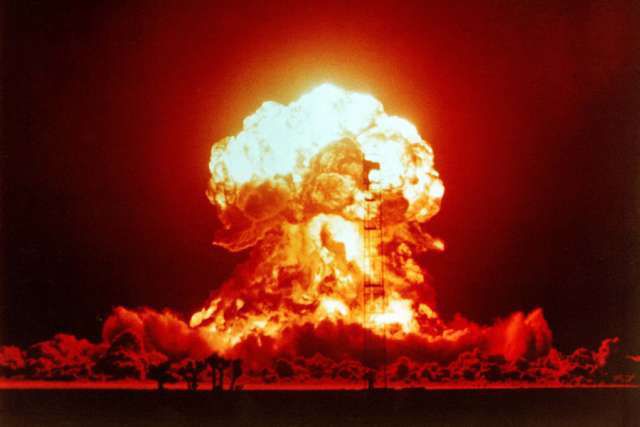Washington D.C., Jul 6, 2017 / 11:21 am (CNA/EWTN News).- Just days after North Korea tested an intercontinental ballistic missile that can reach Alaska, bishops in the United States and Europe have called for the “total elimination of nuclear weapons.”
“Even a limited nuclear exchange would have devastating consequences for people and the planet. Tragically, human error or miscalculation could lead to a humanitarian catastrophe,” the Bishops said in a joint declaration on Thursday. “We call upon the United States and European nations to work with other nations to map out a credible, verifiable and enforceable strategy for the total elimination of nuclear weapons.”
Entitled “Nuclear Disarmament: Seeking Human Security,” the declaration was issued to coincide with the conclusion of a meeting hosted this week by the United Nations “to negotiate a legally binding treaty to prohibit nuclear weapons, leading towards their total elimination.”
While the United States and most European nations are not participating in the U.N. meeting, the bishops urged any country that is building up their nuclear arsenal to reconsider the effectiveness of this as a security strategy. “...our world has become increasingly multipolar with a variety of threats reaching from terrorism, asymmetrical conflicts, cybersecurity to environmental degradation and poverty, which raises doubts about the adequacy of nuclear deterrence as an effective response to these challenges,” they said.
They also noted that building up a nuclear arms base is a waste of money, reiterating a point Pope Francis made in 2014, when he said that prioritizing spending on nuclear weapons “is a mistake and a misallocation of resources which would be far better invested in the areas of integral human development, education, health and the fight against extreme poverty.”
In another message in March 2017, Pope Francis said that peace and security were not built on a race to power and arms, but on “on justice, on integral human development, on respect for fundamental human rights, on the protection of creation, on the participation of all in public life, on trust between peoples, on the support of peaceful institutions, on access to education and health, on dialogue and solidarity.”
Francis is joined by numerous other Catholic leaders including Pope Benedict XVI, Pope John Paul II, Pope John XXIII and Pope Paul VI who all opposed the development of nuclear weapons.
The bishops closed their statement with another statement of Pope Francis, who said in 2014: “Nuclear deterrence and the threat of mutually assured destruction cannot be the basis for an ethics of fraternity and peaceful coexistence among peoples and states. The youth of today and tomorrow deserve far more. They deserve a peaceful world order based on the unity of the human family, grounded on respect, cooperation, solidarity and compassion. Now is the time to counter the logic of fear with the ethic of responsibility, and so foster a climate of trust and sincere dialogue."
The statement was signed by Archbishop Jean-Claude Hollerich, president of the Conference of European Justice and Peace Commissions, and by Bishop Oscar Cant√∫, chairman of the committee on International Justice and Peace for the United States Conference of Catholic Bishops.

